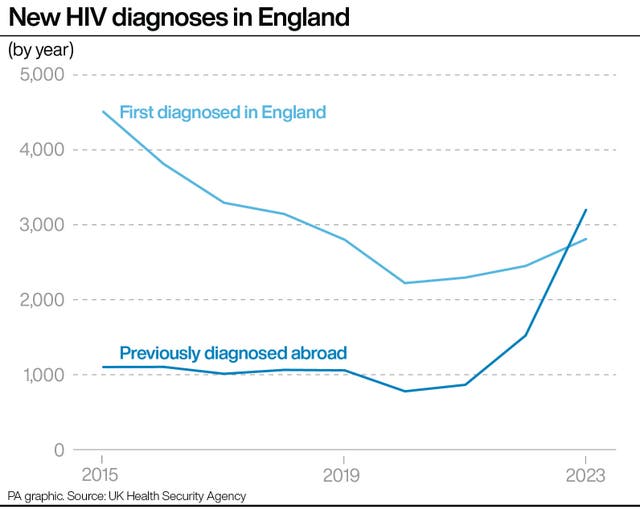The aim of ending new cases of HIV in England is “at risk”, experts have warned after an increase in cases.
New figures show the number of people diagnosed with HIV in England rose by up to 15% between 2022 and 2023.
Officials previously set a goal to end new HIV transmissions in England by 2030.
The latest figures show the number of HIV diagnoses first made in England increased from 2,451 in 2022 to 2,810 in 2023, although the UK Health Security Agency (UKHSA) said this is “likely over-estimated by between 253 and 436 people”.

Officials said they are working to “further explore the reasons for this rise in new diagnoses” but they could include the opt-out testing programme in emergency departments, clinics not reporting some diagnoses which have been previously diagnosed abroad, or underlying transmission.
The figures also show that 40% of people whose HIV was first diagnosed in England in 2023 were diagnosed at a late stage, when HIV has already started to damage the immune system.
Overall a total of 6,008 HIV diagnoses were recorded in England last year, including those previously diagnosed abroad – up 51% from 3,975 in 2022, and also up 56% from 3,859 in the pre-pandemic year of 2019.
More than half (53%) of all HIV diagnoses in 2023 were among people previously diagnosed abroad.
New HIV data shows the goal of ending new cases in the UK by 2030 is in jeopardy.
"Time is of the essence" says our Chief Executive @RichardAngell, responding to HIV data published today.
👇Read the full statementhttps://t.co/6C3WacYVjE pic.twitter.com/Rs4byKPXUq
— Terrence Higgins Trust (@THTorguk) October 1, 2024
The UKHSA said: “This report shows that the number of people first diagnosed with HIV in England has risen in 2023 and there is further evidence of widening inequalities.”
It added that the increase has “disproportionately affected ethnic minority groups”.
The figures show the number of diagnoses in England among men exposed to the virus through sex with other men rose by 7%, from 761 in 2022 to 811 in 2023.
There was a 7% increase in diagnoses in ethnic minority men compared with a 3% rise in white men.
For men exposed to HIV through sex with women, the number of new diagnoses first made in England rose by 36% from 445 in 2022 to 605 in 2023.
It rose by 30% from 602 to 780 among women exposed to the virus through sex with men.
"The latest #HIV data in #England shows that inequality stands in the way of people being able to live well with HIV, and puts the goal of ending new cases of HIV at risk", our CEO Robbie Currie has said:
Read the full statement on our websitehttps://t.co/FqzczTPrUo pic.twitter.com/RUbB2lqX50
— National AIDS Trust (@NAT_AIDS_Trust) October 1, 2024
Commenting on the figures, Robbie Currie, chief executive at the National Aids Trust, said: “Although there is much to celebrate with HIV treatment and prevention, the latest published HIV data in England shows clearly that a continuing lack of equity and equality is standing in the way of people being able to live well with HIV, and puts the goal of ending new cases of HIV in this country at risk.
“The UK Government must respond in full to the worsening disparities and trends that we see in this data, with a strategy, funding and action.”
Sexual health charity Terrence Higgins Trust said the goal of ending new cases by 2030 is “in jeopardy”.
Chief executive Richard Angell said: “Today’s new figures show people from ethnic minorities face an increasing burden of HIV, with rising diagnoses and worse health outcomes than the population as a whole.
“Recent strong progress among gay, bisexual and other men who have sex with men seems to have stalled.
“And, almost across the board, the picture is worse for those living outside of London, where resources are most limited.
“Today’s figures are a call to action: we need innovation and new resources to address these health inequalities and reach the 2030 goal. Time is of the essence.”
Dr Tamara Djuretic, co-head of HIV at the UKHSA, said: “It is clear that more action is needed to curb new HIV transmissions, particularly among heterosexuals and ethnic minority groups.
“Addressing these widening inequalities, ramping up testing, improving access to PrEP (pre-exposure prophylaxis) and getting people started on HIV treatment earlier will all be crucial to achieving this.
“HIV can affect anyone, no matter your gender or sexual orientation, so please get regularly tested and use condoms to protect you and your partners’ health.
“An HIV test is free and provides access to HIV PrEP if needed. If you do test positive, treatment is so effective that you can expect to live a long, healthy life and you won’t pass HIV on to partners.”
Public health minister Andrew Gwynne said: “This data shows we have much more work to do and brings to light concerning inequalities in access to tests and treatments.
“I will be working across government to ensure that we work to stop HIV transmissions for good.
“Our new HIV Action Plan aims to end transmissions in England by 2030 with better prevention, testing and treatment.”




Comments: Our rules
We want our comments to be a lively and valuable part of our community - a place where readers can debate and engage with the most important local issues. The ability to comment on our stories is a privilege, not a right, however, and that privilege may be withdrawn if it is abused or misused.
Please report any comments that break our rules.
Read the rules hereLast Updated:
Report this comment Cancel